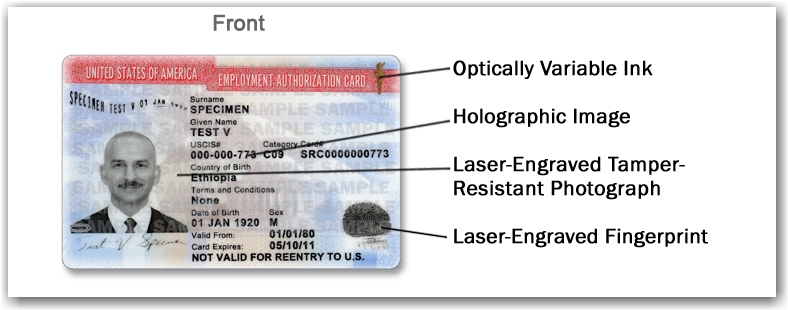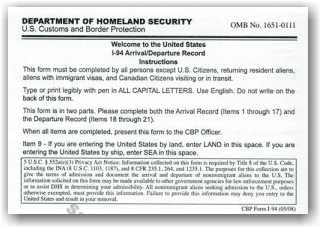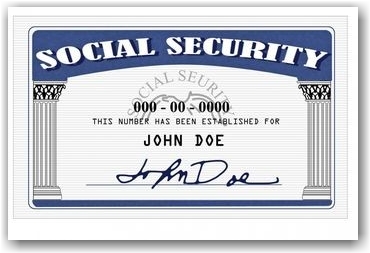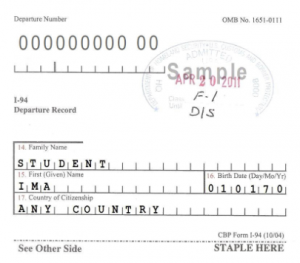Posts Tagged ‘ICE’
Thursday, August 16th, 2012
The Department of Justice Office of Public Affairs recently published a press release pertaining to the employment of two refugees resolving allegations that the company discriminated under the anti-discrimination provision of the Immigration and Nationality Act (INA), when it impermissibly delayed the start date of two refugees after requiring them to provide specific Form I-9 documentation. Best Packing’s violations occurred when they required the refugees to supply the company with additional Form I-9 verification documents in excess of the law. The claim alleged that other non-refugee employees were not required to supply documents other than state issued licenses and social security cards.
In two charges filed with the department, the refugees alleged that they were not allowed to begin employment until they produced unexpired, Department of Homeland Security-issued employment authorization documents, despite the fact that they initially presented sufficient documentation for employment eligibility verification purposes. The charging parties had presented unexpired state identification cards and unrestricted Social Security cards. The state ID’s and unrestricted SS cards were deemed insufficient proof of work authorization.
It is necessary for all those charged with Form I-9 processing at your organization to be very familiar with the list of acceptable documents and to have a thorough understanding of the fact that each employee has the right to present a list A document or a combination B plus C document as long as they are acceptable documents, appear to be genuine and represent the employee that is before you.
Under the settlement agreement, Best Packing agreed to pay $4,379 in back pay and comply with all the requirements of the INA. Understanding the Form I-9 requirements for verifying refugee/asylee(s) will prevent your company from falling victim to similar discriminatory hiring practices.
The process by which an employer is required to verify the employment eligibility of a refugee/asylee(s) when presented with documentation other than the above-referenced List B plus List C combination, can be a bit complicated. Let’s review this.
Asylees and Refugees are individuals seeking the protection of the United States due to persecution suffered in the home country based upon: race, religion, nationality, social group, or political ideology. These individuals are authorized to work in the US because of their immigration status. When presented with documentation of asylum or refugee status, it is advisable to be aware of the following in regard to examining the I-9 form and the documents presented:
SECTION 1:
- The employee should check the “An alien authorized to work” box
- Write the I-94 or Alien Registration Number in the first space
- Write “N/A” in the second space, because their employment authorization does not expire

SECTION 2:
Acceptable Documents are I-94, I-766, or their Employment Authorization Document also known as an EAD card

NOTE: this section presents two different scenarios that require strict attention to time restrictions and combinations of required documents to be presented in order to comply with the USCIS regulations. To complete this section choose from the applicable scenarios below:
Scenario One: Refugee presents a Form I-94:
When presented with a Form I-94 containing an unexpired refugee admission stamp, the employer must accept it as a receipt establishing both employment authorization and identity for 90 days. After 90-days, the employee must present either an EAD or a combination of a List B document and List C (an unrestricted social security card.)



Scenario Two: Asylee presents a Form I-94:
An employer must accept Form I-94 or Form I-94A with one of the stamps or notations below indicating asylee status:
- Asylum granted indefinitely
- 8 CFR 274a.12(a)(5)
- INA 208
This is a List C document that does not require/contain an expiration date. However, the asylee will need to present a List B identity document with this Form I-94.
*Decisions from immigration judges granting asylum are not acceptable.


For further assistance on training your company’s hiring personnel on all of the requirements of Form I-9 compliance, contact one of our immigration professionals at info@immigrationcompliancegroup.com or call 562 612.3996.
Tags: Best Packaging I-9 Ruling, DOJ, I-9 Acceptable Documents, I-9 Anti-Discrimination Provision, I-9 Discrimination, I-9 Document Examination, I-9 for Refugees/Asylees, I-9 Over-Documentation, I-9 Training, I-9/E-Verify News, ICE, OSC, Worksite Enforcement
Posted in Employer Compliance, I-9/E-Verify News, ICE, Immigration News, Uncategorized, USCIS | Comments Off on Form I-9 How To Guide: Employing Refugee/Asylee(s)
Tuesday, August 14th, 2012
By: Timothy Sutton, Communications Editor

The biggest names in banking, Goldman Sachs, JP Morgan, Wells Fargo, Bank of America, Lehman Brothers, MF Global, Countrywide, and Chase have been subject to financial misconduct investigations for imprudently squandering hundreds of millions of dollars. Last week the Justice Department made the unfortunate announcement that Goldman Sachs would not be charged for its infamous trades. Yet over the past few years, despite the devastating impact hedging bad debt has done to our economy, virtually no criminal or civil penalties have ensued. Economists and legal analysts have a range of theories attempting to explain how crimes of “greed” go virtually unpunished; one plausible explanation is we are all to blame: investors, bankers, consumers, government and regulators all contribute to the degradation of our banking system. The SEC has become somewhat of a paper tiger launching costly and intricate investigations resulting in piles of reports that ultimately assign no guilt.
Conversely, ICE investigations almost invariably result in hefty civil and even criminal fines. Deportation raids and I-9 audits are typically swift and allow few of the procedural processes that SEC, Department of Treasury, or Department of Labor investigations require. Over the past few years, there have been record numbers in both deportations and employer sanctions issued by ICE and the USCIS. Unlike greed, failure to maintain a lawful workforce endures the cold chill of ICE.
Shockingly, the public reaction to the financial crisis has been fractured and highly politicized. Remember the Tea Party and Occupy movements? Alternatively, punishing companies employing immigrant workers has found a stronghold in national politics. While it is unjustifiable to violate any law of the United States, it is alarming that those who protest against the corruption of financial institutions are considered extremists, but those who protest against hiring immigrants are nationalists? It is possible that the simpler the crime the harsher the time explains this phenomenon. Americans don’t understand how billions of dollars could disappear from the banks they entrusted their life-savings to; but can easily conceptualize how an immigrant workforce may under-cut “American” employment.
As business owners, violating simple duties like Form I-9 compliance and employment verification through E-Verify may result in the most damaging penalties. There are no congressional investigations, lengthy judicial proceedings, or public sentiment to lessen the blow of an ICE audit. In light of our current social political environment it would be a prudent investment to seek the advice of immigration professionals to proactively prepare for an immigration audit. For more information contact one of our immigration professionals at info@immigrationcompliancegroup.com or call 562 612.3996.
Tags: Bank of America, Chase, Countrywide, Curency Hedging, Goldman Sachs, I-9/E-Verify News, ICE, ICE Audits, JP Morgan, Lehman Brothers, MF Global, Mortgage-Backed Securities, Too Big to Fail, Wall Street Firms, Wall Street Meltdown, Wells Fargo
Posted in DOJ, Employer Compliance, I-9/E-Verify News, ICE, Immigration News | Comments Off on Enforcement Seesaw: Financial v. Immigration Violations | Immigration Compliance Group News
Sunday, August 12th, 2012
By: Timothy Sutton, Communications Editor
On August 10, 2012, the 3rd Circuit Court of Appeals ruled in favor of Wal-Mart Stores Inc., facing charges for acts of transporting illegal immigrants, harboring illegal immigrants, encouraging illegal immigration, conspiracy to commit money laundering, and involuntary servitude. Zavala et al. v. Wal-Mart Stores Inc., spanned eight years and four judicial opinions. The allegations against Wal-Mart suggested that senior officials knowingly and willingly permitted contractors and sub-contractor to hire illegal immigrants to perform after-hour janitorial services.
In their defense, Wal-Mart asserted that the plaintiff janitorial workers were not employees (therefore, not under their control), but also performed work at a Marriott hotel, a movie theater, and remodeling homes. Further, Wal–Mart often used store associates (regular, non-contract employees) to clean its stores. As a result, the court found that Wal-Mart did not knowingly hire illegal immigrant workers or encourage their contractors to do so. The court refused to certifying the class action based upon the shared discrete characteristic of plaintiffs as undocumented immigrants, stating: “Being similarly situated does not mean simply sharing a common status, like being an illegal immigrant.”
Moving forward, it is likely that Wal-Mart will amend its screening and compliance policies when hiring contractual workers. Many of the allegations against the big-box retailer reveal suspect employment practices that should be avoided including:
- Management commenting on immigration status of workers
- Using out-of-state relief workers immediately following the arrest of workers by federal immigration authorities
- Allowing workers to store personal belongings in store
- Allowing workers to sleep in store
For more information about the latest immigration court rulings and other breaking immigration news, subscribe to our blog and contact our office to discuss your I-9 audits, training and compliance program needs, 562 612.3996, info@immigrationcompliancegroup.com.
Tags: Employer Compliance I-9/E-Verify, ICE, illegal immigrants, Legal Workforce, Undocumented Workers, Walmart Janitor Contractors, Walmart Janitorial Class Action
Posted in Employer Compliance, I-9/E-Verify News, ICE, Immigration News | Comments Off on Squeaky Clean? Wal-Mart Escapes Janitorial Class Action | Immigration Compliance Group News
Sunday, July 29th, 2012
 By: Timothy Sutton, Communications Editor
By: Timothy Sutton, Communications Editor
Wait Wait… Don’t Tell Me! is a comedic quiz program on NPR, testing listener’s knowledge of current events against some of the best and brightest in the news world. While figuring out what’s real news versus what’s made up, the show’s host presents a scenario to the contestant to determine if the scenario is fact or fiction. If you weren’t tuned into C-SPAN, you may have legitimately mistaken the House oversight committee’s interview, of the Secretary of the Department of Homeland Security (DHS) Janet Napolitano, as the latest episode of Wait Wait.
In this episode, members of the Congressional oversight committee rapidly fired questions at Napolitano, cutting short her responses, attempting to validate their “real news,” as something more than “made up.” The result, a trial like inquisition reminiscent of the famous scene between Tom Cruise and Jack Nicholson from A Few Good Men, with Napolitano ceremoniously remarking “you can’t handle the truth!” In reality, with grace and imperturbable resolve, Napolitano slowly roasted over the House Committee’s rotisserie.
Attacks upon the DHS Secretary by Chairman Lamar Smith (R-TX), Sensenbrenner (R-WI), Conyers (D-MI), and many more; indicated summary judgment has been rendered against the DHS for their approach to immigration enforcement, particularly in the areas of: visa overstays, boarder security, and deferred action. The business community should take note; Napolitano’s significant immigration reforms have yet to satisfy Congressional discontent. Looking forward, expect tighter regulation of business immigration under the guise of immigration overhaul.
Here are some DHS immigration reform highlights Napolitano submitted to Congress:
- Current DHS immigration reform focuses resources on repeat immigration law violators
- Numerous improvements were made to welcome business people…staying true to our history as a nation of immigrants
- Deterring Employment of Aliens not authorized to work by:
- Eliminating high-profile raids and focusing on compliance through criminal prosecution of egregious employer violators, Form I-9 inspections, civil fines, and debarment
- Since 2009, ICE audited more the 8,079 employers, debarred 726 companies, and imposed $87.9 million in financial sanctions
- Educated the business population through instituting:
- E-Verify with more than 385,000 participants
- E-Verify self-check
- Improving Legal Immigration:
- Streamlining path for EB-5 entrepreneurs and clarifying the EB-2 classification
- Instituted Entrepreneurs in Residence program and proposed regulatory changes in the Federal Register in April 2012 to minimize delays of family based immigration petitions
- Reduced processing of benefit requests through Electronic Immigration System of Registration (ELIS)
- Implemented “Study in the States” initiative to attract international students through a streamlined visa process
- Comprehensive Immigration Reform:
- Supporting the Supreme Court’s decision on Section 2(B) of S.B. 1070
Napolitano capped off her remarks on immigration stating, “only a nationwide solution will resolve the challenges posed by the current immigration system.”
Despite the Congress clearly conveying their message to DHS, “Wait wait, don’t tell me, you think you’re doing a good job…” Napolitano’s focus on streamlining existing immigration policies is positive news for US businesses. Until the promise of streamlining comes to fruition, removing your business from the auditing radar, enrolling in E-Verify, and becoming Form I-9 compliant remain immigration best practices.
If you can handle the truth about current immigration policies, subscribe to our blog and stay informed by checking out our I-9 Employer Resource Center and join our LinkedIn Group.
Tags: Comprehensive Immigration Reform, Deferred Action, Department Of Homeland Security (DHS), DHS Secretary Napolitano, E-Verify, E-Verify Self Check, EB-5 Investor Visa, Entrepreneurs in Residence, form I-9, I-9/E-Verify News, ICE, ICE investigations, Legal Workforce, Napolitano's Congressional Testimony, Study in the States, US Immigration Policy
Posted in Comprehensive Immigration Reform, Congress, Department Of Homeland Security (DHS), I-9/E-Verify News, ICE, Immigration Legislation, USCIS | Comments Off on DHS Secretary Roasted By Congressional Committee | Immigration Compliance Group News
Saturday, July 7th, 2012
By: Timothy Sutton, Communications Editor
 California’s governor is poised to sign a bill AB 1081 dubbed “The Anti-Arizona Act,” officially titled: Transparency and Responsibility Using State Tools or California TRUST Act. The bill is an attempt by California legislators to set a national precedent: local government opting-out of enforcing federal immigration policies. This anti-Arizona legislation arguably mirrors the purpose of Arizona’s SB 1070, selective enforcement of federal immigration laws. Without question, immigration laws are under federal jurisdiction. Enforcement of immigration law is not within the discretionary powers of a state or local government. The TRUST Act is an attempt by California to allow local government to back out of an agreement with the Immigration and Customs Enforcement (ICE) Secure Communities program signed in 2008.
California’s governor is poised to sign a bill AB 1081 dubbed “The Anti-Arizona Act,” officially titled: Transparency and Responsibility Using State Tools or California TRUST Act. The bill is an attempt by California legislators to set a national precedent: local government opting-out of enforcing federal immigration policies. This anti-Arizona legislation arguably mirrors the purpose of Arizona’s SB 1070, selective enforcement of federal immigration laws. Without question, immigration laws are under federal jurisdiction. Enforcement of immigration law is not within the discretionary powers of a state or local government. The TRUST Act is an attempt by California to allow local government to back out of an agreement with the Immigration and Customs Enforcement (ICE) Secure Communities program signed in 2008.
Secure Communities requires that police and law enforcement provide the federal government with fingerprints of criminal suspects detained by local authorities. These fingerprints are run through a federal database for dangerous undocumented criminals; upon discovery of any prior criminal record, undocumented detainees will be placed into expedited deportation proceedings. California’s initiative to overrule nationally implemented immigration programs is teetering on a slippery slope.
AB 1081 requires:
- Local governments pass “opt-in” ordinances in order to continue participation in the Secure Communities Program
- Submit “anti-racial profiling” plans to the DOJ and monitoring associated with Secure Communities participation
- The modified participation agreement must include safeguards against racial profiling not limited to:
- Prohibiting driver’s license checkpoints to obtain fingerprints
- Establishing an expedited complaint system to review claims prior to removal
Businesses may resent the current administration’s attack on their hiring or employment practices. An unprecedented number of ICE audits, sanctions, civil lawsuits and multi-agency (most recently the SEC) investigations threaten employer’s economic welfare. Nonetheless, allowing states to opt-out of immigration agreements may lead to further complications in the future for American businesses.
While many Americans remain divided on a national Dream Act (deportation stay for undocumented college students), few agree that state enforcement over immigration laws further confuses an already troublesome issue. The solution is to find a nationally supported immigration policy that allows American businesses to thrive, but keeps our borders secure. Critics of AB 1081 believe California will become a “refuge” for undocumented aliens. Currently, our broken immigration system has conflicting policies on employee screening, visa application/renewal, and undocumented criminal deportation. Until the politics of immigration subside, businesses should seek legal assistance to ensure their compliance with ever-changing immigration policies.
Immigration Compliance Group has real-world experience in business and employment-related immigration and compliance matters, ensuring your company’s future is secure. For more breaking immigration news signup to stay informed and contact our office at 562 612.3996 or email info@immigrationcompliancegroup.com.
Tags: AB 1081, California Trust Act, Comprehensive Immigration Reform, Dreamers, Federal Immigraiton Law, ICE, Immigration Legislation, Immigration News, Secure Communities, State and Local Immigration Law, The Anti-Arizona Act
Posted in Comprehensive Immigration Reform, Department Of Homeland Security (DHS), ICE, Immigration Legislation, Immigration News | Comments Off on California Trust Act: AB 1081 | News from Immigration Compliance Group
Sunday, July 1st, 2012
By: Timothy Sutton, Communications Editor
In the USDOJ published decision United States v. Four Seasons Earthworks, ICE made it clear that with respect to form I-9 compliance, late is not any better than never. Four Seasons failed to pass an ICE audit that found incomplete form I-9 List A and List C information. The company asserted they obtained every employee’s social security number and maintained supporting documents (like military IDs and birth certificates) necessary to verify employment eligibility. ICE’s response was terse, “Late production nevertheless does not absolve the respondent from liability.”
Securing qualified employees can be stressful. Once a worthy recruit is hired, employers may be anxious to have the new-hire begin working even before they secure the required documentation to complete the I-9 form. Improper documentation constitutes a violation under the INA. In it’s investigation of Four Seasons Earthworks, the ICE Forensic Auditor calculated penalties based upon the following formula:
 Number of Violations divided by the total number of current & former employees up to inspection date = % of base fine
Number of Violations divided by the total number of current & former employees up to inspection date = % of base fine
Additionally, 5% increases for bad-faith or serious violations are tacked on to penalties. The number of undocumented workers, the size of a business, and previous violations are also considerations that increase penalties.
Thankfully, an employer’s good faith attempt to comply with obligations can influence a penalty reduction. ICE views hiring violations on a continuum, recognizing violations vary in severity. If your company finds itself in a similar situation with employees who are not properly documented, hiring immigration compliance professionals may greatly reduce your chances of incurring audit-initiated penalties. Contact us for support in planning and implementing legally sound solutions to protect your company’s future: 562 612.3996 | info@immigrationcompliancegroup.com.
Tags: DOJ, Four Seasons Earthworks, I-9 AUDIT, I-9 Penalties, I-9/E-Verify News, ICE, ICE Audit, Immigration News, Legal Workforce, OCAHO, Undocumented Workers
Posted in DOJ, I-9/E-Verify News, ICE, Immigration News | Comments Off on I-9 Compliance: Too Much To Ask?
Thursday, May 31st, 2012
 By: Timothy Sutton, Communications Editor
By: Timothy Sutton, Communications Editor
“Homeland Security Investigations is committed to holding businesses and their managers accountable when they knowingly hire an illegal workforce,” –John Kelleghan, Special Agent in charge of HSI Philadelphia.
Homeland Security, the FBI, and ICE did much more than hold GPX/GPX, USA, a seismic surveying company and their field supervisor, Donald Wiggill, “accountable,” by charging the company with a total maximum fine of $10 million, a probation term of five years on each count, and a special assessment totaling $8,000; Wiggill faces an unconscionable indictment of 100 years in prison on all 20 counts, a fine of $5 million, a supervised release term of 60 years, and a special assessment of $2,000. The Texas based company failed to verify the immigration status of nineteen employees and did not prepare the required Form I-9 and supporting documentation concerning the immigrants’ authorization to work in the United States.
John Kelleghan of Homeland Security further justified the Philadelphia HSI decision to levy such harsh punishment for I-9 non-compliance saying, “HSI and our law enforcement partners will continue to ensure that employers follow our nation’s hiring laws, which ultimately protect job opportunities for the nation’s legal workers, and levels the playing field for those businesses that play by the rules.”
The proportionality of the punishment sought for the crime is extremely shocking. Our blog has recently covered the penalties imposed upon, HerbCo, Chipotle, and most recently ABC Tree Professionals, which pale in comparison to the punishment GPX is now facing.
GPX is being treated like a national security threat for mishandling nineteen employees Form I-9s. The difference between thousands of dollars versus millions of dollars in fines, in addition to 100 years of jail time, is the involvement of the FBI and the Homeland Security. GPX is charged with harboring and transporting illegal aliens and conspiracy to commit those offenses as outlined in an indictment by the U.S. Attorney for the Middle District of Pennsylvania, Peter J. Smith. Whether GPX was honestly aware of their employees’ immigration status is still unknown, however proper planning and implementation of I-9 compliance would have saved the company millions in civil penalties and avoided a hundred years of jail time. With the stakes elevated so tremendously high by this multi-departmental crackdown on workforce compliance – who can afford not to get their legal documents in order?
To protect your business and your employees please contact one of our immigration professionals at info@immigrationcompliancegroup.com or call 562 612.3996.
Tags: Department Of Homeland Security (DHS), FBI, GPX, HSI, I-9 Audits, I-9 Fines, I-9 Penalties, I-9/E-Verify News, ICE, ICE investigations, Illegal Aliens, Immigraiton News, Immigration Compliance Group, Legal Workforce, Undocumented Workers
Posted in Department Of Homeland Security (DHS), I-9/E-Verify News, ICE, Immigration News, OSC | Comments Off on Form I-9/E-Verify News: FBI & ICE Serve TX Surveyors 20 Counts, $5M in Fines and 100 Years in Prison for 19 Illegal Workers
Monday, May 21st, 2012
By: Timothy Sutton, Communications Editor
 Since February of 2011, the U.S. Department of Homeland Security, Immigration and Customs Enforcement, as well as the office of the U.S. Attorney for the District of Columbia, have been conducting investigations into Chipotle Mexican Grill’s compliance with employee work authorization laws and regulations. On May 17, 2012, Chipotle received a subpoena from the U.S. Securities and Exchange Commission, requesting information regarding compliance with employee work authorization requirements, related public statements and other disclosures.
Since February of 2011, the U.S. Department of Homeland Security, Immigration and Customs Enforcement, as well as the office of the U.S. Attorney for the District of Columbia, have been conducting investigations into Chipotle Mexican Grill’s compliance with employee work authorization laws and regulations. On May 17, 2012, Chipotle received a subpoena from the U.S. Securities and Exchange Commission, requesting information regarding compliance with employee work authorization requirements, related public statements and other disclosures.
Failing their initial ICE audit exposed Chipotle to the SEC violations under investigation. Even though a year has passed since the company released immigration compliance disclosures to their investors, the current SEC investigation may lead to further fines and federal litigation. In February of 2011, the company filed a Form 8-K with the SEC stating,
“Our business could be adversely affected by increased labor costs or difficulties in finding the right employees for our restaurants.” Unauthorized workers are subject to deportation and may subject us to fines or penalties, and if any of our workers are found to be unauthorized our business may be disrupted as we try to replace lost workers with additional qualified employees. We could also experience adverse publicity arising from immigration-related enforcement activity that negatively impacts our brand and may make it more difficult to hire and keep qualified employees.”
The current SEC investigation has reopened the wound left by the ICE audits Chipotle endured over the past two years. Following the ICE raids of 2010, Chipotle restaurants in Minnesota were issued a Notice of Suspect Documents identifying a large number of employees who appeared not to be authorized to work in the U.S. Employees who were unable to provide valid work eligibility documents were terminated. In December 2010, DHS requested work authorization documents for employees in the District of Columbia and Virginia. At that time, Chipotle filed a statement with the SEC in a Form 10-K stating:
“We believe our practices with regard to the work authorization of our employees, including the review and retention of work authorization documents, are in compliance with applicable law. However, the termination of large numbers of employees does disrupt our operations and results in a temporary increase in labor costs as we train new employees. It is not possible at this time to determine whether we will incur any fines, penalties or further liabilities in connection with these matters.”
The Department of Homeland Security, ICE, and the SEC’s investigation of Chiptole, sends a strong message to American employers that the U.S. government is relentless in its efforts to penalize employers of illegal aliens. ICE audits open the door to immigration, tax, and labor investigations that can cost employers (companies of all sizes – both private and public) millions in fines. In particular, this is a strong message to publicly held corporations that you must take care now more than ever to ensure workforce compliance to avoid falling victim to an SEC probe.
As the mountain of immigration compliance trouble casts a shadow over Chipotle’s recent financial successes, further fines, penalties and liabilities levied by the SEC are sure to follow. For more updates on this matter subscribe to our RSS feed and for more information on how to avoid ICE audits and SEC investigations contact one of our immigration professionals at info@immigrationcompliancegroup.com or call 562 612.3996.
Tags: Chipotle Form 10K, Chipotle Form 8K, Chipotle Mexican Grill, Chipotle SEC Investigation, EMPLOYMENT ELIGIBILITY, Employre Compliance, I-9/E-Verify News, ICE, ICE Audits, Immigration compliance, Legal Workforce, SEC
Posted in I-9/E-Verify News, ICE, Immigration Legislation, Immigration News | Comments Off on SEC & ICE Tag-Team Chipotle Mexican Grill | Immigration Compliance Group News
Monday, May 14th, 2012
 By: Timothy Sutton, Communications Editor
By: Timothy Sutton, Communications Editor
State legislatures in Kansas recently voted down a bill that would mandate all employers utilize the E-verify employment verification system. The federal government currently encourages employer’s voluntary participation in E-verify under the Illegal Immigration Reform and Immigrant Responsibility Act of 1996 (IIRIRA). Although there are numerous benefits to participating in E-verify, blanket mandates burden all businesses regardless of size and resources. Legislatures across the country are proposing these mandates in an attempt to target employers who wish to remain “willfully blind” to their employees immigration status. The Kansas bill proposed excluding contractors who did not participate in E-verify from bidding on government contracts valued at $50,000 and above. When the bill failed by a vote of 84-35 businesses across the state heaved a temporary sigh of relief. Kansas will likely see this bill return in the near future, as the main deterrent for passing the bill was a lack of time and resources to adjust the state budget that takes effect on July 1, 2012.
Employers should be aware that although the federal government controls immigration laws, states are currently placing additional restrictions on employers adding additional layers of compliance measures aimed at reducing illegal immigrant populations. Controversial immigration laws passed by the state of Alabama, which mandate employer’s participation in E-verify, have sparked lawsuits by the Obama administration. Various industries are hit hard by such mandates including the agricultural industry.
Numerous farmers have prepared for a significant reduction in available labor by planting crops that can utilize machines to perform the work in place of immigrant laborers. H.B. 87, which recently passed in the state of Georgia, requires that all public employers and private employers utilize E-verify in advance of securing business licenses and permits. While these mandates appear to keep employers “honest,” in their hiring practices, they come at both an economic and social cost. Businesses bear the economic burden of compliance while minority populations pay the social cost of increased racial discrimination.
Mandates create an additional layer of workplace compliance that many small businesses lack the manpower and training to adhere to. Additionally, workplace verification screening without proper guidance by attorneys or employment specialists may lead to an increase in discriminatory employment practices. In light of the growing trend of state laws mandating E-verify participation, employers are encouraged to seek trained professionals for training and education on compliance with the law. For more information contact one of our immigration professionals at info@immigrationcompliancegroup.com or call 562 612.3996.
Tags: E-Verify, Georgia H.B 87, I-9 Form, I-9/E-Verify News, I-9/E-Verify News, ICE, ICE Audits, Kansas E-Verify Bill, Legal Workforce, State Legislatures, Undocumented Workers
Posted in I-9/E-Verify News, ICE, Immigration Legislation, Immigration News | Comments Off on E-Verify: State Legislatures Push For E-Verify Mandates | News from Immigration Compliance Group
Wednesday, May 9th, 2012
 We had the ICE IMAGE Training and Forum in Los Angeles last week on May 3rd where they explained the benefits of the IMAGE Program and followed up with releasing all the Powerpoint Presentations through email after the event. They have made some excellent information available to the public on their website; namely:
We had the ICE IMAGE Training and Forum in Los Angeles last week on May 3rd where they explained the benefits of the IMAGE Program and followed up with releasing all the Powerpoint Presentations through email after the event. They have made some excellent information available to the public on their website; namely:
- An HSI I-9 Presentation
- An IMAGE HSI Presentation
- OSC IMAGE Event Presentation
- Self Check User Presentation
- E-Verify Presentation
We felt that their perspective on the above topics was critical information to be shared and analyzed alongside your other resources. They can be accessed here.
Please know that we are available to assist you with your compliance program and offer practical and sustainable services and solutions to assist you in establishing a compliant workforce.
Tags: HSI, I-9 Audits, I-9 Fines, I-9 Form, I-9 Training, I-9/E-Verify News, ICE, ICE Training, IMAGE Training, Legal Workforce, OSC, Undocumented Workers
Posted in I-9/E-Verify News, ICE, Immigration News, OSC | Comments Off on I-9 Form/IMAGE: ICE Releases PPT Presentations Following Los Angeles Training Event













 By: Timothy Sutton, Communications Editor
By: Timothy Sutton, Communications Editor